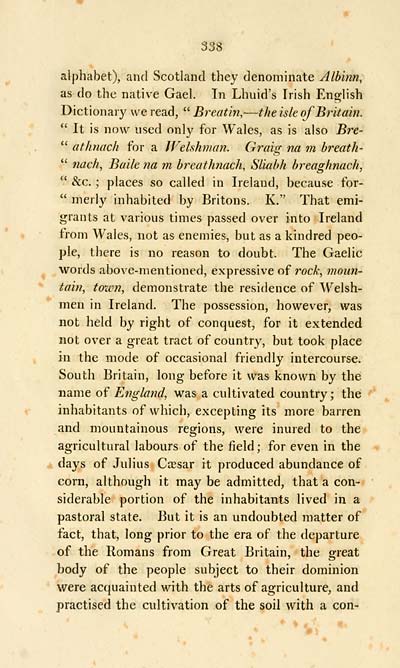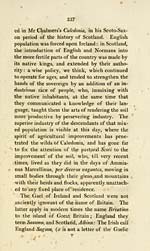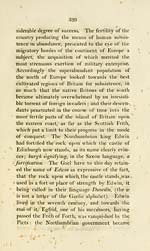Download files
Complete book:
Individual page:
Thumbnail gallery: Grid view | List view

338
alphabet), and Scotland they denominate Albinn,
as do the native Gael. In Lhuid's Irish Ensjlish
Dictionary we read, " Breat'm, — the isle of Britain.
" It is now used only for Wales, as is also Bre-
" athnach for a JVehhman. Graig na m breath-
" nach, Baile na m breathnach, Sliabh breaghnach,
" &c. ; places so called in Ireland, because for-
" merly inhabited by Britons. K." That emi-
grants at various times passed over into Ireland
from Wales, not as enemies, but as a kindred peo-
ple, there is no reason to doubt. The Gaelic
words above-mentioned, expressive of rock, moun-
tain, tourn, demonstrate the residence of Welsh-
men in Ireland. The possession, however, was
not held by right of conquest, for it extended
not over a great tract of country, but took place
in the mode of occasional friendly intercourse.
South Britain, long before it was known by the
name of England, was a cultivated country; the
inhabitants of which, excepting its more barren
and mountainous regions, were inured to the
agricultural labours of the field ; for even in the
days of Julius CiEsar it produced abundance of
corn, although it may be admitted, that a con-
siderable portion of the inhabitants lived in a
pastoral state. But it is an undoubted matter of
fact, that, long prior to the era of the departure
of the Romans from Great Britain, the great
body of the people subject to their dominion
were acquainted with the arts of agriculture, and
practised the cultivation of the soil with a con-
alphabet), and Scotland they denominate Albinn,
as do the native Gael. In Lhuid's Irish Ensjlish
Dictionary we read, " Breat'm, — the isle of Britain.
" It is now used only for Wales, as is also Bre-
" athnach for a JVehhman. Graig na m breath-
" nach, Baile na m breathnach, Sliabh breaghnach,
" &c. ; places so called in Ireland, because for-
" merly inhabited by Britons. K." That emi-
grants at various times passed over into Ireland
from Wales, not as enemies, but as a kindred peo-
ple, there is no reason to doubt. The Gaelic
words above-mentioned, expressive of rock, moun-
tain, tourn, demonstrate the residence of Welsh-
men in Ireland. The possession, however, was
not held by right of conquest, for it extended
not over a great tract of country, but took place
in the mode of occasional friendly intercourse.
South Britain, long before it was known by the
name of England, was a cultivated country; the
inhabitants of which, excepting its more barren
and mountainous regions, were inured to the
agricultural labours of the field ; for even in the
days of Julius CiEsar it produced abundance of
corn, although it may be admitted, that a con-
siderable portion of the inhabitants lived in a
pastoral state. But it is an undoubted matter of
fact, that, long prior to the era of the departure
of the Romans from Great Britain, the great
body of the people subject to their dominion
were acquainted with the arts of agriculture, and
practised the cultivation of the soil with a con-
Set display mode to: Large image | Transcription
Images and transcriptions on this page, including medium image downloads, may be used under the Creative Commons Attribution 4.0 International Licence unless otherwise stated. ![]()
| Early Gaelic Book Collections > Ossian Collection > Thoughts on the origin and descent of the Gael > (350) |
|---|
| Permanent URL | https://digital.nls.uk/82238644 |
|---|
| Description | Selected books from the Ossian Collection of 327 volumes, originally assembled by J. Norman Methven of Perth. Different editions and translations of James MacPherson's epic poem 'Ossian', some with a map of the 'Kingdom of Connor'. Also secondary material relating to Ossianic poetry and the Ossian controversy. |
|---|
| Description | Selected items from five 'Special and Named Printed Collections'. Includes books in Gaelic and other Celtic languages, works about the Gaels, their languages, literature, culture and history. |
|---|

